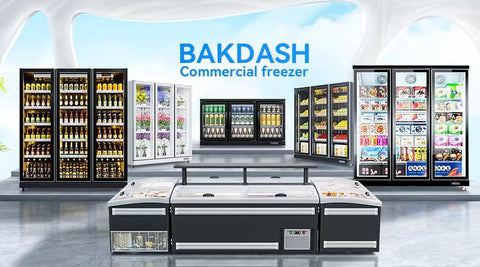Unveiling the Crucial Role of Evaporator Coils in Commercial Refrigerators
Share
The Heart of Cooling: Evaporator Coils in Commercial Refrigerators
In the bustling world of food service and retail, commercial refrigerators stand as the guardians of freshness, preserving products to ensure they reach consumers in perfect condition. Amidst the sleek designs and digital controls, there lies a pivotal component that often goes unnoticed – the evaporator coil. This article delves deep into the inner workings of commercial refrigerators, shining a spotlight on the crucial role played by these unsung heroes.

The Heart of Cooling: Evaporator Coils
How Do Evaporator Coils Work?
Picture the evaporator coils as the heartbeat of a commercial refrigerator, ceaselessly toiling to maintain the desired temperature. These coils operate like enchanting wands, drawing warmth from the refrigerator's interior. This transformative process causes the refrigerant within the coils to evaporate, extracting heat from the surrounding air and leaving a chilly atmosphere in its wake.
In essence, much like perspiration cools your body on a sweltering day, the evaporator coils cool the refrigerator's interior. This chilled air circulates, enveloping products in a refreshing aura that safeguards their quality. It's a harmonious dance between science and practicality, where the coils perform their duty with quiet dedication.

Frost Accumulation and Defrosting
Yet, even these hardworking coils face a minor hurdle – frost accumulation. Moisture within the refrigerator's air can cling to the evaporator coils, eventually forming frost. While visually appealing, this frosty layer can disrupt efficiency.
To counteract this natural process, commercial refrigerators are equipped with defrost systems. These systems activate periodically to melt accumulated frost, ensuring the coils remain unencumbered and ready to efficiently maintain the desired temperature.
Common Issues with Evaporator Coils
Coil Corrosion
While built to withstand challenging conditions, evaporator coils are not impervious to corrosion's advances. Think of corrosion as a persistent foe slowly corroding metal. In the case of coils, corrosion can lead to minuscule leaks that escalate over time. These leaks not only hinder cooling efficiency but can also result in refrigerant leakage – a dual threat impacting cooling performance and environmental considerations.
Imagine it as a battle between the stalwart coils and insidious corrosion. Regular maintenance acts as armor, identifying corrosion early and shielding coils from its grasp. It's akin to a protective shield ensuring your coils continue their magic unhindered.
Inadequate Cooling
Ever opened your commercial refrigerator to discover that ice cream isn't as solid as anticipated or that frozen produce appears less vibrant? Inadequate cooling might be traced back to an evaporator coil struggling to perform.
Frost accumulation and dirt buildup on coils impede their ability to absorb heat. It's akin to trying to sip through a straw with an obstruction – achievable, but less efficient. Likewise, compromised coil performance impacts product quality and strains the refrigerator's compressor, potentially leading to premature wear.
Strange Noises
Standing by your refrigerator and hearing unanticipated gurgles, hisses, or clanks? These auditory surprises might stem from your evaporator coils. If the coils are the heart, then refrigerant coursing through them is the lifeblood. Any irregularities in this flow translate to peculiar sounds.
Gurgles could indicate low refrigerant levels, hissing might signal a refrigerant leak, and clanking could point to loose components. These sounds aren't random quirks; they're often the coils' way of signaling an issue. Addressing them promptly can prevent more extensive complications and potential future repairs.

Maintaining Evaporator Coils
Tools Needed for Cleaning
Fear not, maintaining evaporator coils doesn't demand an elaborate toolbox. The tools required are simple yet effective companions on your cleaning journey:
- Soft Brush: A gentle aide for sweeping away loose dirt and debris without causing harm.
- Vacuum Cleaner with Brush Attachment: An essential partner for suctioning dislodged grime. The brush attachment ensures a thorough clean without damaging coils.
- Coil Cleaning Solution: A mystical elixir that conquers stubborn grease and grime, restoring your coils to a sparkling state.
Step-by-Step Cleaning Process
Cleaning evaporator coils might seem daunting, but the process is surprisingly straightforward:
- Unplug the Refrigerator: Safety first. Disconnect the refrigerator before beginning, ensuring no risk of electric shock.
- Access the Coils: Depending on the design, you may need to remove panels to access the coils – unveiling the refrigerator's core.
- Brush Away Dust: Gently brush off any dust or dirt clinging to the coils, awakening them from their slumber.
- Vacuuming: Introduce your vacuum cleaner with the brush attachment to suction up dislodged debris, leaving coils spotless.
- Clean with Solution: For stubborn spots, the coil cleaning solution is your ally. Follow instructions to apply and watch grime dissolve.
- Rinse and Dry: Once clean, rinse coils with water to remove residual solution. Allow them to air dry before reconnecting the refrigerator. Just like us, coils appreciate a moment to refresh.
This process extends beyond cleaning; it's a gesture of gratitude to the unsung heroes ensuring your products remain cool and pristine.

At [BAKDASH Refrigeration Equipment Co., Ltd.], we offer a wide range of commercial refrigerators designed to meet the unique needs of various businesses. Whether you're looking for walk-in coolers, reach-in refrigerators, display cases, or merchandisers, our products deliver top-notch performance to ensure your business's success. Contact us today to explore our commercial refrigerators and find the perfect solution for your specific business needs.

